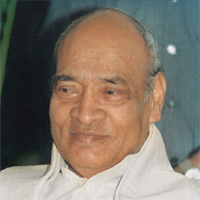P. V. Narasimha Rao
Pamulaparthi Venkata Narasimha Rao was an Indian lawyer and politician who served as the 10th Prime Minister of India from 1991 to 1996. His ascendancy to the prime ministership was politically significant in that he was the second holder of this office from a non-Hindi-speaking region and the first from South India.
Son of Shri P. Ranga Rao, Shri P.V. Narasimha Rao was born on June 28, 1921 at Karimnagar. He studied in Osmania University, Hyderabad, Bombay University and the Nagpur University. A widower, Shri P.V. Narasimha Rao is the father of three sons and five daughters.
Being an agriculturist and an advocate, he joined politics and held some important portfolios. He was the Minister of Law and Information, 1962-64; Law and Endowments, 1964-67; Health and Medicine, 1967 and Education, 1968-71, Government of Andhra Pradesh. He was the Chief Minister, Andhra Pradesh, 1971-73; General Secretary, All India Congress Committee, 1975-76; Chairman, Telugu Academy, Andhra Pradesh, 1968-74; Vice-President, Dakshin Bharat Hindi Prachar Sabha, Madras, from 1972. He was also Member, Andhra Pradesh Legislative Assembly, 1957-77; Member, Lok Sabha 1977-84 and was elected to Eighth Lok Sabha from Ramtek in December, 1984. As Chairman, Public Accounts Committee, 1978-79 he participated in a Conference on South Asia convened by the School of Asian and African Studies, London University. Shri Rao also Chaired Bhartiya Vidya Bhavan’s Andhra Centre; he was Minister for External Affairs from January 14, 1980 to July 18, 1984; Minister of Home Affairs from July 19, 1984 to December 31, 1984 and the Minister of Defence from December 31, 1984 to September 25, 1985. He then assumed charge as Minister of Human Resource Development on September 25, 1985 .
After Rajiv Gandhi’s assassination in May 1991, the Congress (I) Party chose Rao as its leader, and he became India’s 10th prime minister after the general elections in June. Rao almost immediately began efforts to restructure India’s economy by converting the inefficient quasi-socialist structure left by Jawaharlal Nehru and the Gandhis into a free-market system. His program involved cutting government regulations and red tape, abandoning subsidies and fixed prices, and privatizing state-run industries. Those efforts to liberalize the economy spurred industrial growth and foreign investment, but they also resulted in rising budget and trade deficits and heightened inflation. During Rao’s tenure, Hindu fundamentalism became a significant force in national politics for the first time, as manifested in the growing electoral strength of the Bharatiya Janata Party and other right-wing political groupings. In 1992 Hindu nationalists destroyed a mosque, leading to sectarian violence between Hindus and Muslims that persisted throughout Rao’s term as prime minister. Corruption scandals rocked the Congress (I) Party, which continued its long decline in popularity and lost control of several major state governments to opposition parties in 1995.
village of Laknepalli village of Narsampet mandal. he completed part of his primary education in Katkuru village of Bheemdevarapalli
He spoke 17 languages

P. V. Narasimha Rao
Date of Birth: 28 Jun 2021
Birth Place: Laknepally
Proffession: Former Prime Minister of India
Nationality: Indian
Death: 23 December 2004, New Delhi


